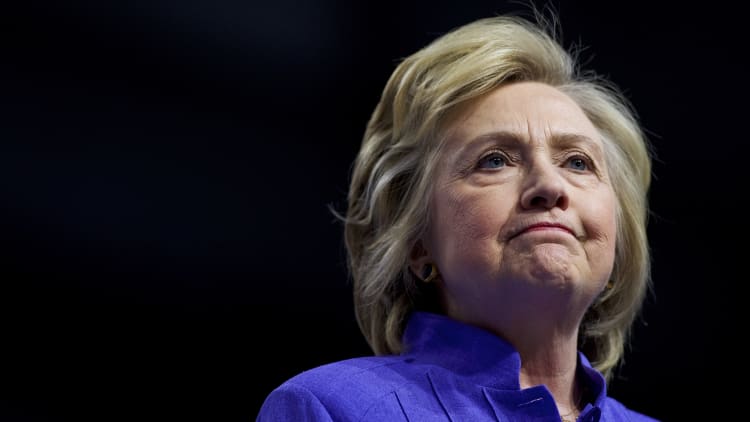Hillary Clinton and Donald Trump have proposed bold growth plans that would impact the economy in divergent ways. Neither, though, is likely to see the light of day.
While anxious voters mull which of the two highly unpopular candidates has the better plan — or at least will do less damage — there's a growing sense on Wall Street that the end result will be simply more of the same. Washington will remain in a partisan standoff, with the result being growth at a marginally faster pace that will bring inflation and higher interest rates.
"Our base case is continued gridlock in Washington D.C. and we do not anticipate major changes to U.S. fiscal policy or economic policy," Nomura economists said in a report for clients. "With this outlook, continued partisan gridlock after the election seems quite likely. Consequently, our base case forecast for the U.S. economy does not anticipate material changes to U.S. economic policy."
It's not that the candidates won't try.
The Republican Trump arguably has the more aggressive plan, with steep tax cuts for individuals and businesses coupled with sharp spending increases for infrastructure and the military. Clinton also proposes a stimulus package, but her spending plan is offset, though not completely, with tax increases.
Clinton wants immigration reform that Nomura said will add 2.5 million new members to the workforce, while Trump wants to deport illegal immigrants and slap tariffs on products from nations that he believes engage in unfair trade practices.
Ultimately, though, political reality sets in.

In the most likely case, Nomura believes Clinton is a substantially better bet to win the presidency, but then will face a Republican Congress most likely hostile to her ideas and unwilling to implement an agenda that would be similar to President Barack Obama's during his eight years in office.
Polls agree that Clinton is the likely 45th president, but they've been narrowing. The Real Clear Politics average gives Clinton a 2.4-point edge in a four-person race. The widely watched FiveThirtyEight forecast still gives Clinton a 68.2 percent chance of winning, though that's down sharply from 89.2 percent on Aug. 14.
One outlying Nomura scenario entails Trump winning and keeping a Republican Congress with which "he may be able to implement a substantial amount of his policies." The other is a Clinton landslide where the House turns Democratic, in which case "Clinton would have a better chance of implementing more of her agenda."
If either candidate's plans were implemented, Nomura believes Clinton's would result in faster growth.
"Our economic analysis suggests under Clinton's plan, growth would be higher over the both short- and medium-term and would increase interest rates moderately relative to baseline," the economists wrote.
"In contrast, Trump's fiscal policies would be highly stimulative initially, but his other policies would boost inflation notably and, given that the economy is close to full employment, the (Fed) would likely react more strongly to Trump's mix of policies. Our simulations suggest that Trump's policies would generate better growth in the short-term but also likely generate higher interest rates and tighter financial conditions."
The fairly subdued look differs from some other analyses that see Trump's spending plans adding $10 trillion or more to the $19.5-trillion national debt, a number that has increased by 84 percent during the Obama administration. Most notably, Mark Zandi, the chief economist at Moody's Analytics, has projected that Trump's plans would cause a "lengthy recession" and that Clinton's ideas would be better for growth.
However, the gridlock camp is expanding.
Ethan Harris, global economist at Bank of America Merrill Lynch, said his forecast is for "continued split government."
"In our view, such an outcome would be essentially a nonevent for the markets and the economy," Harris said in a note. "It would make it very hard to implement some of the more aggressive proposals out of the campaign. And it would represent continuation rather than change."
To be sure, Harris believes there will be some extra spending at the federal level, with more likely in a Trump win. But he believes if Republicans hold Congress, neither candidate will get all she or he wants.


